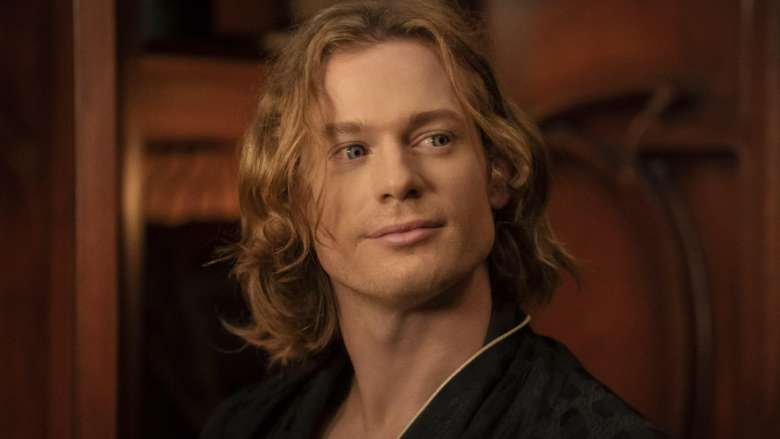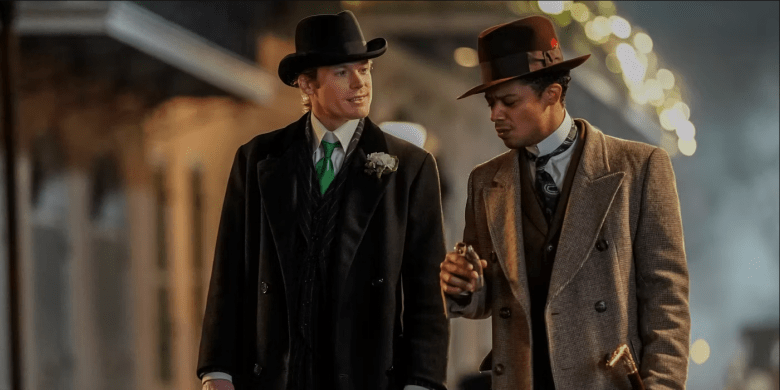In the AMC series Interview with the Vampire, journalist Daniel Molloy is surprised when Louis compares his appetite for blood to his sexual orientation. You accepted your homosexuality at the same time as you killed, he comments. What would queer theory say about this? It’s a valid question, because much of the plot revolves around the love between Louis and Lestat.
This time, unlike the book – and also Neil Jordan’s film version, the homoerotic context is quite explicit. It takes the screenplay through complicated places and, in particular, uncomfortable questions in the way it analyzes various themes. In particular, the sexuality of its characters.
Is there a homophobic substrate in comparing death or, for that matter, murder to sexual self-discovery? In fact, what might seem like an insinuation of reprehensible impulses becomes an allegory of freedom.
Interview with the Vampire: Love, Desire and Blood
Indeed, the main premise of the series strongly emphasizes that its characters are outside any human norm. But, at the same time, closely linked by multiple feelings that converge in love.
If in the literary version of Interview with the Vampire the latent erotic tension between Lestat and Louis developed as a repressed instinct and a form of guilt, in the series it takes another turn. The screenplay gives itself the freedom to carefully examine how the desire and the appetite for blood merge and coalesce into a single gratification.
However, Louis’ need for Lestat is not just that of a pupil for his mentor or the fear of a seductive creature. The production explores their story to the point where the two have a deep, singular and, arguably, violent bond. So strong that it involves the carnal, the mental and the spiritual to support a complex and overwhelming whole.
Love for eternity and in the middle of the shadows
One of the storyline strengths of Interview with the Vampire is its ability to extrapolate the appetite for blood to other layers of the personality. But he also manages to separate the mere physical and, according to the story, relentless desire from the gaze of a grown-up gay love affair.
During the first meeting between Louis and Lestat, the latter drinks the blood of his future ward. Not so much to kill him, but, in the character’s words: To leave an indelible mark on him. The next thing that happens is a scene that is rarely shown in productions. General public.
The two lie down side by side, catching their breath. But the production ensures that the atmosphere is one of deep intimacy. Far from a scene of violence, there is a well-constructed substratum of mutual needs. A newborn bond that becomes more meaningful and real as the story progresses.
Sex, blood and bites in Interview with the Vampire
Interview with the Vampire, which is a pioneering work in terms of queer themes and points of view, analyzes its characters from an emotional point of view. Louis does not hesitate to express the fear she feels at the mere possibility of being attracted to a man. Little by little, the scenario gives depth to the need for physical and romantic connection of the protagonists. He does this with a delicacy and reverence that turns long conversations, and even violent scenes, into symbols of more complex points.
The Interview with the Vampire series AMC’s Interview with the Vampire series is the essence of Rice’s novel and the entirety of her universe taken to the next level. It may not respond to the parameters of the setting and the specific details of the story, but it respects the spirit of it. More importantly, it is the elaborate and careful construction of the psychology of its characters. Adding an explicit mention of their sexual orientation allows the plot to cut through more complex elements regarding the psyches of its characters. At the same time, an increasingly eloquent spin on how the idea of sexuality can be shown queer without resorting to hackneyed turns of phrase or platitudes.
A story that reinvents itself for the new millennium
Of course, the relationship between Lestat and Louis is marked by a complicated power imbalance and the imprint of violence. This is not an example to follow, let alone a sound idea in general. Still, Interview with the Vampire’s approach strays from the idea of building characters limited by their sexuality.
Homophobia, the fear of finding love that goes against culture and society, is shown as a painful fact. Gradually, the plot takes space and time to tell the story of a gay relationship that does not obey the idea of stigma or inherent evil. A frequent stereotype on television and which the series subtly diverts towards its supernatural subjects.
In fact, in many of the most significant moments in human history, women have been the primary victims of war. Interview with the Vampire, the love between its characters is a powerful physical and natural force. There are moments of tenderness, small gestures of shared intimacy that highlight what is happening between the protagonists. Beyond the monstrous condition they share, Louis and Lestat are, this time, spiritual companions. A couple in fullness, sharing the sorrows, the sufferings and the slowness of the understanding of nature which unites them through a real bond.
Physical love in Interview with the Vampire
The series does not hesitate at all to show the desire and the physical love between its characters. But his sex scenes aren’t gratuitous, and each of them is filled with a delicacy of approach that’s new. Bites which, in the mythology of Rice, are equated with sex – with hugs, knowing glances and kisses. Interview with the Vampire shows its characters in a private world that they construct with difficulty but patience.
It’s surprising how the script reflects on the maturity of adult love between two men without resorting to the ease of desperate need. Lestat and Louis are linked by simple physical attraction, and then by the fact that they are inexplicable creatures. Nonetheless, the romantic connection is real, nuanced, and in a way that helps to understand both characters.
Unlike the contained distance of Neil Jordan’s film, the series. Interview with the Vampire pays homage to sexuality, to love in all its strangeness. Ultimately, also to a queer relationship that doesn’t need to justify its existence beyond mutual attraction. “Many accidents happen in the world and in history. Love is part of it, Lestat tells Louis after making him drink his blood. Perhaps the best definition of how AMC’s production captures the eroticism that plot can provide.


